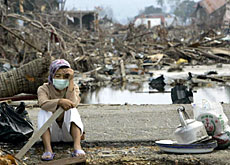Swiss seek to prevent Red Cross conflict

Switzerland is offering to organise a conference later this year to resolve the contentious issue of a new symbol for the Geneva-based Red Cross movement.
The long-standing controversy focuses on the refusal by Israel to adopt either of the movement’s two approved emblems on religious grounds.
The Israeli aid organisation, Magen David Adom (Red Star of David), has wanted to join the International Federation of Red Cross and Red Crescent Societies since 1949.
But its application request has always been rejected owing to Israel’s unwillingness to adopt either the red cross or the red crescent symbol.
The International Committee of the Red Cross (ICRC), which is separate from the Federation, has long had a solution worked out: in addition to the cross and crescent there should be a third neutral symbol, the red crystal, the organisation’s Jean-François Queguiner told swissinfo.
This would be used in war and conflict zones as the standard protective emblem of the Red Cross movement.
“In other areas of activity it would be up to the individual national societies to decide whether to place a symbol of their choice – cross, crescent or star – inside the red crystal,” Queguiner said.
Before an additional symbol can be adopted there has to be a third additional protocol to the Geneva Conventions, which all 191 signatory states must approve.
The Swiss foreign ministry last month sent a diplomatic note to the other 190 countries. The note contained an offer from Switzerland, the depository state of the Geneva Conventions, to host a conference on the issue at the end of October.
Swiss diplomat Didier Pfirter has already begun holding consultations ahead of the possible conference. He has met representatives of 40 countries in Geneva, and has visited six capital cities in the Middle East.
Optimism
For the ICRC the emblem problem is one for politicians to solve.
“We are not getting involved,” spokeswoman Antonella Notari told swissinfo. “The foreign ministry is making intensive efforts.”
“We are more optimistic than we have been for a long time. The signs are good – there is broad support for the additional protocol to the Geneva Conventions.” The only unknown, Notari said, was how long the process would take.
Although the situation in the Middle East is still decisive for the emblem question, the ICRC has for some time been trying to find a symbol without cultural or religious associations that would allow the organisation to fulfil its mission, the spokeswoman said.
American pressure
In protest at the decision not to accept the Israeli Magen David Adom organisation into the International Federation of Red Cross and Red Crescent Societies, the American Red Cross froze its contributions to the institution five years ago.
Federation spokesman Frank Mohrhauer would not be drawn on the amount of money withheld. “But it is certainly a large amount,” he told swissinfo. American sources have put the figure at more than SFr35 million ($29 million).
Faced with the United States payment boycott, the Federation is considering imposing sanctions, in accordance with its internal rules. The next general meeting in November will examine the issue of the arrears.
Unless the shortfall is met, US representatives will no longer be eligible for positions in the Federation’s governing bodies.
The Federation’s Roy Probert does not believe that these sanctions, damaging though they are, will lead to a conflict between Geneva and Washington. “There are other more important problems for the US,” he said.
Antonella Notari says it is unlikely the US will “take revenge” on the ICRC. But the US is still the biggest contributor to the organisation, paying in over SFr200 million a year.
And the American Red Cross is not synonymous with the Bush government, Notari says. While it is understood that the Republican dominated Congress could take action against the unloved ICRC, the US government recognises and appreciates the efforts of Switzerland, the ICRC and the Federation to resolve the conflict, she adds.
Middle East conflict
The solution to the emblem problem, which Switzerland has long supported, could have been implemented five years ago. A conference of signatories to the Geneva Conventions was initially planned for October 2000.
But Switzerland shelved the meeting after the then Israeli opposition leader, Ariel Sharon, visited the site in Jerusalem known to Jews as the Temple Mount. The site is also sacred to Muslims. Immediately after that the second Palestinian Intifada began.
Although the situation in the Middle East is less tense now, it is still not sure that the use of the “red crystal” as the protective emblem of the Red Cross movement would be universally respected.
swissinfo, Jean-Michel Berthoud
The Geneva-based ICRC was founded in 1863.
It assists victims of war and armed violence.
In 2003 Switzerland gave around SFr90 million to the ICRC, while the US contributed SFr221 million.
The International Federation of Red Cross and Red Crescent Societies was founded in 1919.
It coordinates disaster relief by the national societies.
The secretariat in Geneva has an annual budget of SFr38 million, of which a quarter normally comes from the US. The US suspended payments in 2000.
The red cross emblem is based on the Swiss flag with the colours reversed.
The red crescent was adopted during the war between Russia and Turkey (1876-1878). It is based on the Turkish flag, with the colours switched.
Some countries, including Israel, have lobbied for the use of another symbol, arguing that the cross and crescent have religious associations.

In compliance with the JTI standards
More: SWI swissinfo.ch certified by the Journalism Trust Initiative











You can find an overview of ongoing debates with our journalists here . Please join us!
If you want to start a conversation about a topic raised in this article or want to report factual errors, email us at english@swissinfo.ch.